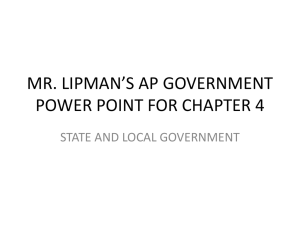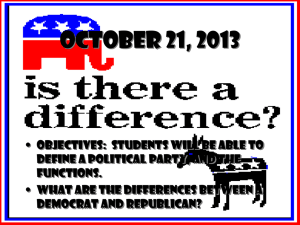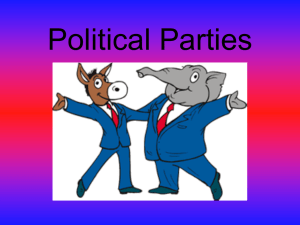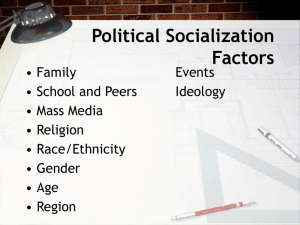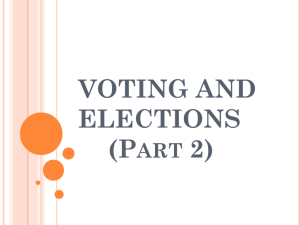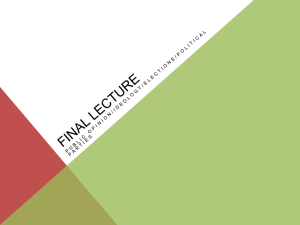The Morning Call Muhlenberg College Institute of Public Opinion
advertisement
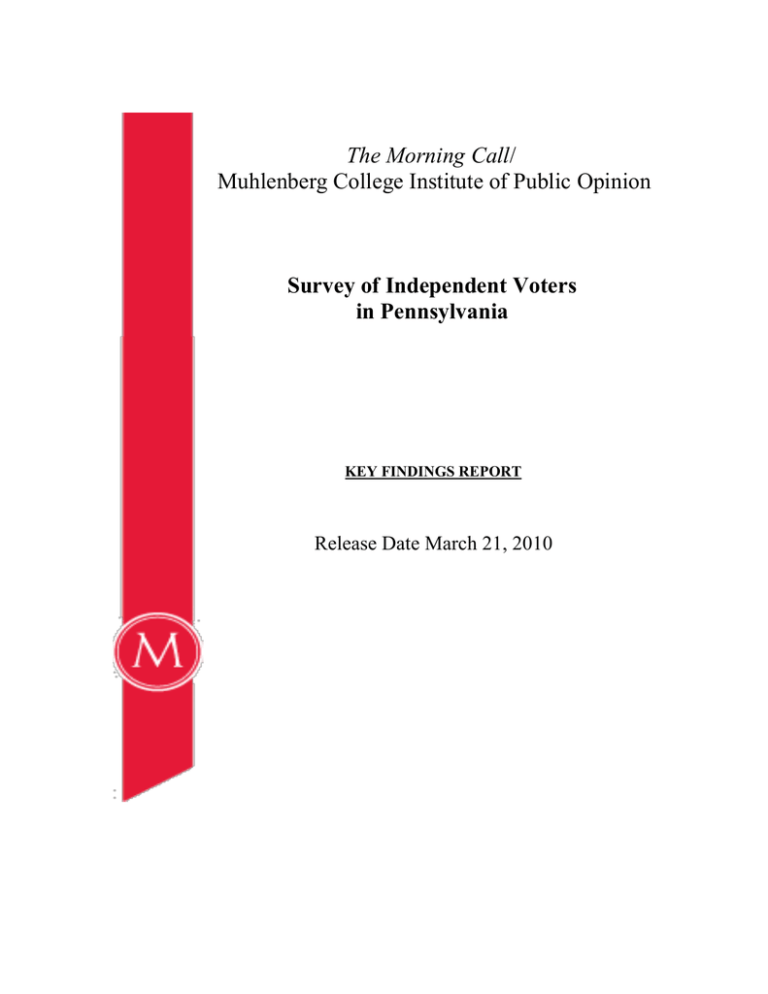
The Morning Call/ Muhlenberg College Institute of Public Opinion Survey of Independent Voters in Pennsylvania KEY FINDINGS REPORT Release Date March 21, 2010 KEY FINDINGS: 1. Despite providing strong support for Barack Obama during the 2008 presidential election, significantly more independents in Pennsylvania now disapprove of the way he is handling his job than approve of his work. 2. Registered independents in the Keystone State have very strong levels of disapproval for both Democrats and Republicans in Congress with over 2 out of 3 voters rating both major parties’ legislative efforts negatively. 3. Independent voters in Pennsylvania maintain generally unfavorable views about both the Democrat and Republican Party, with the most unfavorable feelings directed to the GOP. 4. Pennsylvania’s registered independents have fairly divided views about the Tea Party Movement, with a substantial number of non-affiliated voters unsure about what this movement stands for. 5. The Commonwealth’s independent voters report ideological beliefs that can best described as moderate to conservative leaning in nature. 6. While independent voters in the state were more likely to align with the Democrats on issues such as environmental protection, health care and social policy, they are more likely to find agreement with the Republican Party on defense and anti-terrorism policy. 7. The Keystone State’s registered independents indicate an equal likelihood of voting for Democrat or Republican candidates in this fall’s congressional elections. METHODOLOGY: The following key findings report summarizes data collected in a telephone survey of Pennsylvanians who are registered as non-affiliated or independent voters in the state. The surveys were conducted between March 11 and March 16, 2010. The sample frame for the survey was created from the Commonwealth of Pennsylvania voter files. In the case where a phone number was not provided for an independent voter we attempted to match the voters name with existing public phone records in order to provide the most inclusive sampling frame from which to randomly select voters for inclusion in the survey. Interviewing was conducted via telephone, with 437 surveys completed. This number of completions results in a margin of error of +/- 5% at the 95% confidence interval. However the margin of errors for sub groups (i.e. women, income groups, age categories) is larger due to smaller sample size. Percentages throughout the survey have been rounded upward at the .5 mark, thus many totals in the results will not equal 100%. The survey questionnaire was designed by Christopher Borick, PhD of the Muhlenberg College Institute of Public Opinion (MCIPO) in consultation with staff members of the Morning Call. The analysis was written by Dr. Borick and Joe Caporoso, Assistant Director of the MCIPO. OVERVIEW: One of the most significant trends in contemporary American politics has been the growth in the number of Americans who describe themselves as independent voters. An aggregation of dozens of national polls by Pollster.com indicates that more Americans describe themselves as independents than either Democrat or Republican. While it appears that the number of independents is on the rise, it is less clear what these voters are looking for in terms of the political system. It is for that reason that the Muhlenberg College Institute of Public Opinion and the Morning Call sought to survey Pennsylvania’s independent voters on their beliefs and desires. According to the Commonwealth’s Secretary of State there are about half a million residents of the Keystone State who have registered to vote as independents. Because state election laws prohibit independents from voting in party primaries, the percentage of independents in the state is low in comparison with many other states. Nevertheless in an election year with a high profile U.S. Senate race, at least 10 competitive congressional districts and a new governor being selected, Pennsylvania’s independents are poised to play an important role in determining if Democrats continue their recent electoral success or if a GOP renaissance is on the way. WHO ARE THE INDEPENDENTS?: Much has been made about the ideological leanings of the independent voters. Are they centrist voters that find the two major parties too extreme, or do they tend to hold strong ideological positions that neither party adequately represents? Our findings suggest that registered independents in the Commonwealth may best be described as “center-right” on a left to right continuum. Nearly one in four independents identify themselves as “moderate,” with 45% “conservative” and 28% “liberal.” Notably, 3 out of 4 independents fall into the moderate or only somewhat liberal or conservative categories, compared with a little over 1 in 5 independents who call themselves very conservative or very liberal. TABLE ONE Ideological Leanings of Registered Independent Voters Ideological Beliefs Very Conservative Somewhat Conservative Somewhat Liberal Very Liberal Moderate Not Sure N = 434 Percentage Responding 14% 31% 20% 8% 24% 3% The primary factors that have caused independent voters to forsake registering with one of the major parties are quite diverse. When asked in an open ended form why they decided to register as an independent instead of registering with a political party, Pennsylvania independents most commonly noted anger and dissatisfaction with Democrats and Republicans (37%), and the freedom to chose any candidate (26%) as the primary reason for their choice. TABLE TWO Primary Reasons for Registering as an Independent Reason Angry At Republicans and Democrats Want Freedom to Pick Any Candidate Don’t Want To Be Affiliated With Any Party Moderate or Feel Equal Towards Both Parties Want to Pick Person Over Party Other Not Sure Percent Responding 37% 26% 9% 6% 5% 14% 4% N=436 (NOTE: The question was asked in an open ended manner) INDEPENDENT VOTER VIEWS ON THE POLITICAL PARTIES: While dissatisfaction with the political parties has driven many independent voters to make the choice of being unaffiliated, these voters are regularly involved in elections where the choices are limited to Democrats and Republicans. Thus we sought to determine how independents view party positions. The survey findings indicate that on key areas of public policy the Commonwealth’s independent voters tend to alternate support between the Democrats and Republicans. While more independents agree with the Democratic Party positions on issue such as health care, environmental protection and social issues, Republican positions are preferred on national defense and fighting terrorism. The only policy areas where independent voters were equally divided on which party they most aligned with were economic policy and managing budget deficits and debt TABLE THREE “Which Party do You Agree More with on the Issues?” Defense Health Care Economic Policy Managing Deficits and Debt Anti-Terrorism Environment Social Policies Democrats Republicans Not Sure 42% 33% 35% 25% Both the Same 18% 15% 21% 34% 27% 41% 31% 26% 20% 47% 44% 42% 21% 23% 25% 18% 20% 12% 13% 13% 11% 11% 13% 13% With independent voter’s policy preferences failing to align with one of the two major parties it is not surprising that they have a strong preference for the growth of a third party to meet their interests. Just under 6 out of 10 registered independents in Pennsylvania indicated that a third party is needed in the United States in order to adequately represent the interest of the American people compared with 1 in 4 that believe the Democrats and Republicans are currently doing a sufficient job in representing the public. TABLE FOUR “Do the Republican and Democrat parties do an adequate job of representing the American people, or do they do such a poor job that a third major party is needed?” Response Do an Adequate Job Third Party Needed Not Sure Percent Responding 23% 57% 20% N=435 But even as these voters seek something different than the major party candidates there is a hesitancy to throw their support to third party or independent candidates for fear that their votes would lead to their “least favorite” candidates winning elections. Nearly 4 out of 10 registered independents indicated that they would not vote for a third party or independent candidate if it meant that the candidate they least agreed with would win the race. TABLE FIVE “ Would you vote for a third party or independent candidate if you knew that a vote for that candidate would make it more likely that the candidate you least agree with in the election would win the race?” Response Would Vote For Would Not Vote For Not Sure Percent Responding 42% 39% 20% N=435 INDEPENDENT VIEWS ON THE PRESIDENT AND CONGRESS: In 2008 registered independents were a key part of the electoral coalition that provided Barack Obama with his solid victory in the Commonwealth. A majority of independents in the state voted for Obama in the last presidential election helping him to his convincing win in Pennsylvania. TABLE SIX 2008 Presidential Votes Among Registered Independents Vote Status Barack Obama John McCain Other Didn’t Vote Not Sure Percent Responding 51% 35% 6% 7% >1% N= 415 The picture today is quite different with significantly more independents in the state disapproving of the President’s job performance than those approving of Obama’s work in the White House. Nearly half of all registered independents in Pennsylvania currently disapprove of how the president is handling his job. TABLE SEVEN Approval Ratings for President Obama Response Approve Disapprove Not Sure N = 432 Percent Responding 38% 48% 14% The president’s diminished standing among Pennsylvania independents has not translated to support for the work being done by Republicans in Congress. Only 1 out of 5 registered independents in the state approve of the way GOP officials in Washington D.C. are performing. Notably, exactly the same number of independent voters approve of the way Democrats in Congress are doing their job. Simply put, the Commonwealth’s independent voters do not like much of what they see happening in the nation’s capital. TABLE EIGHT Approval Ratings for Democrats and Republicans in Congress Republicans 20% 67% 13% Approve Disapprove Not Sure Democrats 20% 68% 12% N=434 INDEPENDENT PERCEPTIONS OF THE TEA PARTY MOVEMENT: One of the defining features of American politics in the last year has been the growth of the Tea Party Movement. As independents find little good in the Republicans and Democrats that are leading the nation, they give more mixed reviews to the emergence of the Tea Party. Among independents that had an opinion about the Tea Party Movement there were fairly equal levels of favorable and unfavorable ratings. TABLE NINE Independent Voters’ Views on the Tea Party Movement Response Favorable Unfavorable Not Sure Percent Responding 27% 32% 41% N=434 Registered independents in the Commonwealth appear to have fairly limited understanding about the Tea Party movement stands for. Nearly 6 out of 10 independent voters across the state indicated that they didn’t know much about what the Tea Party stands for, with 4 in 10 undecided if they like or dislike this movement. TABLE TEN Level of Knowledge About the Tea Party Movement Among Independent Voters Response A Great Deal A Good Amount Just Some Very Little Not Sure Percent Responding 9% 22% 30% 29% 11% N=433 INDEPENDENTS AND VOTING BEHAVIOR: As de facto freelance voters Pennsylvania’s registered independents are seen as important players in determining election outcomes. A plurality (43%) of independent voters in the Commonwealth tend to vote about equally for Democrats and Republicans, with 1 in 4 usually voting Democratic and 1 in 5 usually voting for GOP candidates. TABLE ELEVEN Voting Patterns Among Registered Independents Response Usually Republican Candidates Usually Democratic Candidates About Equal Other Not Sure Percent Responding 20% 25% 43% 8% 6% N=434 Given their divided views on the parties it’s not surprising that Pennsylvania independents are torn on which party’s candidate they plan to support in the upcoming congressional elections. About 1 in 4 independents is planning to vote for a Democrat in their congressional district, with another 1 in 4 planning to support the GOP candidate in the midterm election. Most notably 4 out of 10 independents are undecided on which party’s candidate they will back come November, making them a prime target for candidates enmeshed in tight races. TABLE TWELVE Which Party’s Candidate Do You Plan To Support in Upcoming Congressional Elections Democrat Republican Other Not Sure 29% 26% 12% 33% N= 435 (Note: Results include leaners) CONCLUSION: With all the dissatisfaction and conflicted views regarding the two major parties it is understandable that a solid majority of the state’s independent voters maintain the view that a third party is needed to represent the American people. But even as these voters seek something different there is a hesitancy to throw their support to third party or independent candidates for fear that their votes would lead to their “least favorite” candidates winning elections. So for the short term it is likely that the Pennsylvania independent will continue to grudgingly choose between Democrats and Republicans, and by doing so remain a coveted prize for the political parties that they carry so much animosity for. QUESTIONS AND RESULTS Pennsylvania Independent Voter Survey Muhlenberg College Institute of Public Opinion/Morning Call Field Dates – March, 11 to February 16, 2010 Population – Registered Independents Sampling Procedure – Random selection from state voter files with phone match 437 Completed Surveys Margin of Error = +/- 5% at 95% Level of Confidence Percentages are rounded at .5 level; totals may not equal 100% Q1: Conformation of status as registered independent. Q2: Which of the following best describes your past voting registration status. In the past you were a… Registered Democrat Registered Republican Registered With Another Political Party Registered With Different Political Parties Over the Year Always Registered as Independent Not Sure 16% 17% >1% 8% 58% >1% Q3: How many years have you been registered as an independent voter in Pennsylvania? 1-5 Years 6-10 Years 11-20 Years Over 20 Years Not Sure 37% 18% 14% 30% 1% Q4: Which of the following best describes your political beliefs? Very Conservative Somewhat Conservative Somewhat Liberal Very Liberal Moderate Not Sure 14% 31% 20% 8% 24% 3% Q5: In the last Presidential election did you vote for Barack Obama or John McCain? Barack Obama John McCain Other Didn’t Vote Not Sure 51% 35% 6% 7% >1% Q6: If the elections for Congress were being held today, which party’s candidate would you vote for in your congressional district? Democrat Republican Other Not Sure 23% 24% 11% 42% Q7: As of today, who do you lean more toward? (Only those who chose “Not Sure” in Q6) Democrat Republican Other Not Sure 13% 6% 3% 79% COMBINED Q6 and Q7 Democrat Republican Other Not Sure 29% 26% 12% 33% Q8: No matter how you plan to vote in the upcoming congressional elections please indicate which of the following best describes how you usually vote. Do you usually vote for Republicans, Democrats, or about equally for Democrats or Republicans? Republicans Democrats About Equal Other Not Sure 20% 25% 43% 8% 6% Q9: Do you approve or disapprove of the way Barack Obama is handling his job as President? Approve Disapprove Not Sure 38% 48% 14% Q10: Do you approve or disapprove of the way Republicans in Congress are handling their job? Approve Disapprove Not Sure 20% 68% 13% Q11: Do you approve or disapprove of the way Democrats in Congress are handling their job? Approve Disapprove Not Sure 20% 68% 12% Q12: In general do you have a favorable or unfavorable view of the Democratic Party? Favorable Unfavorable Not Sure 38% 49% 14% Q13: In general do you have a favorable or unfavorable view of the Republican Party? Favorable Unfavorable Not Sure 26% 57% 17% Q14: Do you have a favorable or unfavorable impression of the political movement known as the Tea Party? Favorable Unfavorable Not Sure 27% 32% 41% Q15: How much do you feel you know about what the Tea Party stands for: a great deal, a good amount, just some or very little? A Great Deal A Good Amount Just Some Very Little Not Sure 9% 22% 30% 29% 11% Q16: Given what you know about the Tea Party’s positions on the issues, would you say that overall you agree with them strongly, agree somewhat, disagree somewhat or disagree strongly? Agree Strongly Agree Somewhat Disagree Somewhat Disagree Strongly Nothing Not Sure 10% 27% 16% 15% 8% 24% Q17: What is the primary reason that you have decided to register as an independent instead of registering with a political party? Angry At Republicans and Democrats Want Freedom to Pick Any Candidate Don’t Want To Be Affiliated With Any Party Moderate or Feel Equal Towards Both Parties Want to Pick Person Over Party Other Not Sure 37% 26% 9% 6% 5% 14% 4% Q18: Which of the following comes closest to your view of the way the Democratic Party and Republican Party have been dealing with the country’s problems? You are angry at both parties. You are only angry at Republicans. You are only angry at Democrats. You are not angry at either party. Angry at both parties Angry at the Republicans Angry at the Democrats Not Angry at either party Not Sure 55% 9% 10% 25% 2% Q19: In your view, do the Republican and Democrat parties do an adequate job of representing the American people, or do they do such a poor job that a third major party is needed? Do an Adequate Job Third Party Needed Not Sure 23% 57% 20% Q20: Would you vote for a third party or independent candidate if you knew that a vote for that candidate would make it more likely that the candidate you least agree with in the election would win the race? Would Vote For Would Not Vote For Not Sure 42% 39% 20% Q21: For each of the following areas of policy I mention please indicate if you generally agree more with Republicans or Democrats positions on the issue, health care Republicans Democrats Both the Same Not Sure 33% 41% 15% 11% Q22: National Defense Republicans Democrats Both the Same Not Sure 43% 28% 19% 11% Q23: Environmental Protection Republicans Democrats Both the Same Not Sure 21% 48% 18% 13% Q24: Anti-Terrorism Republicans Democrats Both the Same Not Sure 42% 21% 26% 12% Q25: Economic Policy Republicans Democrats Both the Same Not Sure 35% 31% 21% 13% Q26: Managing the Budget deficit and debts Republicans Democrats Both the Same Not Sure 26% 27% 35% 13% Q27: Social Issues Republicans Democrats Both the Same Not Sure 23% 44% 20% 13% Q28: How likely are you to change your registration status from independent to either Democrat or Republican in the next five years? Very Likely Somewhat Likely Not Too Likely Not Likely At All Not Sure >1% 10% 15% 72% 1% Q30: Which of the following categories best describes your racial identity? White/Caucasian African American Hispanic Latino Asian Native American Mixed Race Other 93% 4% >1% >1% >1% >1% >1% 1% Q31: Which of the following best describes your religious affiliation? Catholic Protestant Jewish Hindu Other Religion Atheist Not Sure 29% 46% 2% >1% 17% 3% 4% Q32: What is your current marital status? Single Married Separated Divorced Widowed 19% 67% >1% 5% 8% Q33: What is your highest level of education? Less than high school High school graduate Some college or technical school College Graduate Graduate or Professional Degree 3% 22% 28% 29% 19% Q34: Which of the following best describes your family income? Under $20,000 $20,000-$40,000 $40,000-$60,000 $60,000-$80,000 $80,000-$100,000 Over $100,000 Not Sure 7% 20% 18% 19% 12% 22% 2% Q35: Would you be willing to be contacted by a newspaper reported for an interview? Yes No Not Sure 23% 75% 2% Q36: Gender Male Female 49% 51% SELECTED CROSSTABULATIONS Questions Crossed With Following: Q4: Which of the following best describes your political beliefs? 14% 31% 20% 8% 24% 3% 1% Very Conservative Somewhat Conservative Somewhat Liberal Very Liberal Moderate Not Sure Refused Q8: No matter how you plan to vote in the upcoming congressional elections please indicate which of the following best describes how you usually vote. Do you usually vote for Republicans, Democrats, or about equally for Democrats or Republicans? 20% 25% 43% 8% 6% >1% Republicans Democrats About Equal Other Not Sure Refused Q2: Which of the following best describes your past voting registration status. In the past you were a… Overall Very Conservative Somewhat Conservative Somewhat Liberal Registered Democrat Registered Republican Registered With Another Political Party Registered With Different Political Parties Always Registered as Independent Not Sure 16% 10% 17% 28% >1% 2% 8% 7% 58% 53% >1% 0% 13% 19% 2% 11% 56% 0% 27% 14% 0% 8% 51% 0% Very Liberal Moderate Usually vote Republican Usually vote Democrat About Equal 19% 12% 4% 11% 16% 38% 0% 0% 2% 6% 5% 9% 64% 67% 47% 0% 1% 0% 34% 13% 0% 5% 48% >1% 14% 13% >1% 10% 63% 0% Q3: How many years have you been registered as an independent voter in Pennsylvania? Overall Very Conservative Somewhat Conservative Somewhat Liberal Very Liberal Moderate Usually vote Republican Usually vote Democrat About Equal 1-5 Years 6-10 Years 11-20 Years Over 20 Years Not Sure 37% 33% 18% 18% 14% 17% 30% 30% 1% 2% 42% 21% 13% 23% 2% 37% 17% 13% 31% 1% 39% 32% 41% 17% 15% 15% 11% 14% 19% 33% 40% 24% 0% 0% 1% 42% 14% 14% 29% >1% 33% 22% 12% 33% >1% Q5: In the last Presidential election did you vote for Barack Obama or John McCain? Overall Very Conservative Somewhat Conservative Somewhat Liberal Very Liberal Obama McCain Other Didn’t Vote Not Sure Refused 49% 7% 34% 75% 6% 8% 6% 5% >1% 0% 5% 5% 37% 42% 10% 7% >1% 4% 80% 13% 1% 2% 0% 4% 83% 8% 3% 6% 0% 0% Moderate Usually vote Republican Usually vote Democrat About Equal 52% 9% 27% 79% 3% 5% 9% 7% 2% 0% 7% 0% 90% 5% >1% 3% 0% 2% 50% 30% 7% 8% 2% 5% Q6: If the elections for Congress were being held today, which party’s candidate would you vote for in your congressional district? Overall Very Conservative Somewhat Conservative Somewhat Liberal Very Liberal Moderate Usually vote Republican Usually vote Democrat About Equal Democrat Republican Other Not Sure Refused 23% 7% 24% 53% 11% 12% 42% 28% >1% 0% 15% 39% 10% 37% 0% 43% 4% 6% 47% 1% 50% 18% 4% 6% 14% 61% 19% 15% 5% 25% 53% 31% 0% 1% 0% 57% 4% 7% 33% 0% 18% 20% 12% 50% 0% Q7: As of today, who do you lean more toward? Overall Very Conservative Somewhat Conservative Somewhat Liberal Very Liberal Moderate Democrat Republican Other Not Sure Refused 13% 0% 6% 24% 3% 0% 78% 77% >1% 0% 10% 8% 2% 80% 0% 23% 0% 5% 73% 0% 22% 13% 0% 2% 0% 2% 78% 84% 0% 0% Usually vote Republican Usually vote Democrat About Equal 4% 15% 0% 81% 0% 34% 0% 3% 63% 0% 10% 7% 3% 81% 0% Q9: Do you approve or disapprove of the way Barack Obama is handling his job as President? Overall Very Conservative Somewhat Conservative Somewhat Liberal Very Liberal Moderate Usually vote Republican Usually vote Democrat About Equal Approve Disapprove Not Sure Refused 37% 8% 48% 90% 14% 2% 1% 0% 27% 62% 12% 0% 61% 26% 13% 1% 67% 41% 4% 17% 35% 91% 17% 22% 5% 0% 2% 1% 75% 12% 11% 2% 34% 47% 19% 0% Q10: Do you approve or disapprove of the way Republicans in Congress are handling their job? Overall Very Conservative Somewhat Conservative Somewhat Liberal Very Liberal Moderate Approve Disapprove Not Sure Refused 20% 35% 67% 55% 13% 10% >1% 0% 31% 59% 10% 0% 7% 83% 9% 1% 3% 11% 78% 70% 19% 19% 0% 0% Usually vote Republican Usually vote Democrat About Equal 42% 44% 14% 0% 7% 88% 5% >1% 19% 65% 16% 0% Q11: Do you approve or disapprove of the way Democrats in Congress are handling their job? Overall Very Conservative Somewhat Conservative Somewhat Liberal Very Liberal Moderate Usually vote Republican Usually vote Democrat About Equal Approve Disapprove Not Sure Refused 20% 3% 68% 92% 12% 5% >1% 0% 19% 70% 10% 0% 27% 65% 8% 0% 44% 15% 0% 39% 64% 91% 17% 21% 9% 0% 0% 0% 44% 48% 8% 0% 16% 69% 15% 0% Q12: In general do you have a favorable or unfavorable view of the Democratic Party? Overall Very Conservative Somewhat Conservative Somewhat Liberal Very Liberal Moderate Favorable Unfavorable Not Sure Refused 37% 10% 49% 87% 14% 3% >1% 0% 30% 59% 12% 0% 61% 26% 14% 0% 56% 41% 25% 39% 19% 19% 0% 1% Usually vote Republican Usually vote Democrat About Equal 5% 88% 7% 0% 79% 15% 7% 0% 33% 46% 20% >1% Q13: In general do you have a favorable or unfavorable view of the Republican Party? Overall Very Conservative Somewhat Conservative Somewhat Liberal Very Liberal Moderate Usually vote Republican Usually vote Democrat About Equal Favorable Unfavorable Not Sure Refused 26% 45% 57% 47% 17% 8% >1% 0% 38% 48% 14% 0% 15% 71% 14% 0% 8% 17% 52% 72% 56% 35% 19% 27% 13% 0% 0% 0% 8% 83% 8% 0% 27% 51% 23% 0% Q14: Do you have a favorable or unfavorable impression of the political movement known as the Tea Party? Overall Very Conservative Somewhat Conservative Somewhat Liberal Very Liberal Favorable Unfavorable Not Sure Refused 27% 70% 31% 8% 40% 22% 2% 0% 32% 26% 41% 2% 6% 54% 37% 4% 22% 36% 39% 3% Moderate Usually vote Republican Usually vote Democrat About Equal 17% 59% 33% 14% 50% 27% 1% 0% 11% 57% 29% 3% 22% 29% 48% 2% Q15: How much do you feel you know about what the Tea Party stands for: a great deal, a good amount, just some or very little? Overall Very Conservative Somewhat Conservative Somewhat Liberal Very Liberal Moderate Usually vote Republican Usually vote Democrat About Equal A Great Deal A Good Amount Just Some Very Little Not Sure Refused 9% 27% 21% 30% 30% 18% 28% 22% 11% 3% >1% 0% 8% 24% 34% 25% 8% >1% 7% 19% 27% 36% 11% 1% 11% 1% 15% 17% 17% 28% 36% 35% 32% 14% 33% 19% 22% 14% 6% 0% 1% 0% 8% 25% 27% 26% 11% 2% 8% 16% 33% 32% 11% >1% Q16: Given what you know about the Tea Party’s positions on the issues, would you say that overall you agree with them strongly, agree somewhat, disagree somewhat or disagree strongly? Overall Very Conservative Somewhat Conservative Somewhat Liberal Agree Strongly Agree Somewhat Disagree Disagree Somewhat Strongly Nothing Not Sure Refused 10% 42% 27% 37% 16% 5% 14% 3% 8% 8% 23% 5% >1% 0% 7% 42% 14% 7% 7% 22% 0% 1% 12% 24% 28% 11% 24% 0% Very Liberal Moderate Usually vote Republican Usually vote Democrat About Equal 6% 5% 29% 17% 21% 40% 11% 21% 7% 31% 14% 5% 11% 7% 5% 25% 32% 14% 0% 0% 0% 2% 16% 22% 30% 8% 22% 0% 5% 30% 18% 12% 10% 26% 0% Q18: Which of the following comes closest to your view of the way the Democratic Party and Republican Party have been dealing with the country’s problems? You are angry at both parties. You are only angry at Republicans. You are only angry at Democrats. You are not angry at either party. Overall Very Conservative Somewhat Conservative Somewhat Liberal Very Liberal Moderate Usually vote Republican Usually vote Democrat About Equal Angry At Both Parties Angry At The Republicans Angry At The Democrats Not Angry At Either Party Not Sure Refused 55% 53% 9% 3% 10% 28% 25% 15% 2% 0% >1% 0% 49% 8% 16% 24% 3% 0% 59% 13% 0% 28% 0% 0% 47% 61% 55% 22% 6% 1% 3% 1% 31% 25% 30% 13% 3% 2% 0% 0% 0% 0% 50% 26% 2% 20% 3% 0% 53% 5% 7% 34% 1% 0% Q19: In your view, do the Republican and Democrat parties do an adequate job of representing the American people, or do they do such a poor job that a third major party is needed? Overall Do An Adequate Job Third Party Needed Not Sure Refused 23% 57% 20% >1% Very Conservative Somewhat Conservative Somewhat Liberal Very Liberal Moderate Usually vote Republican Usually vote Democrat About Equal 22% 48% 30% 0% 27% 56% 16% >1% 24% 52% 22% 1% 19% 17% 25% 58% 68% 53% 19% 16% 22% 3% 0% 0% 27% 58% 13% 2% 20% 58% 22% >1% Q20: Would you vote for a third party or independent candidate if you knew that a vote for that candidate would make it more likely that the candidate you least agree with in the election would win the race? Overall Very Conservative Somewhat Conservative Somewhat Liberal Very Liberal Moderate Usually vote Republican Usually vote Democrat About Equal Would Vote For Would Not Vote For Not Sure Refused 42% 50% 39% 38% 20% 10% >1% 2% 35% 44% 21% 0% 35% 42% 23% 0% 36% 52% 33% 44% 29% 44% 19% 18% 22% 0% 1% 1% 37% 41% 22% 0% 46% 36% 18% >1% Q21: For each of the following areas of policy I mention please indicate if you generally agree more with Republicans or Democrats positions on the issue, health care Overall Very Conservative Somewhat Conservative Somewhat Liberal Very Liberal Moderate Usually vote Republican Usually vote Democrat About Equal Republicans Democrats Both The Same Not Sure Refused 33% 73% 41% 13% 15% 8% 11% 5% >1% 0% 50% 31% 14% 5% 0% 9% 66% 12% 11% 2% 6% 19% 78% 78% 37% 8% 11% 20% 7% 6% 23% 7% 0% 0% 0% 4% 79% 8% 7% 2% 30% 38% 20% 12% 0% Republicans Democrats Both The Same Not Sure Refused 42% 78% 27% 7% 18% 7% 11% 8% >1% 0% 57% 22% 15% 7% 0% 23% 44% 21% 8% 4% 19% 29% 84% 56% 24% 4% 17% 27% 4% 8% 19% 9% 0% 0% 0% 15% 55% 21% 8% >1% 40% 24% 23% 11% 1% Q22: National Defense Overall Very Conservative Somewhat Conservative Somewhat Liberal Very Liberal Moderate Usually vote Republican Usually vote Democrat About Equal Q23: Environmental Protection Overall Very Conservative Somewhat Conservative Somewhat Liberal Very Liberal Moderate Usually vote Republican Usually vote Democrat About Equal Republicans Democrats Both The Same Not Sure Refused 21% 57% 47% 10% 18% 20% 13% 13% >1% 0% 28% 42% 17% 13% 0% 9% 69% 12% 8% 2% 6% 9% 60% 75% 49% 18% 11% 23% 11% 8% 19% 12% 0% 0% 0% 5% 79% 12% 3% >1% 14% 48% 22% 16% 0% Republicans Democrats Both The Same Not Sure Refused 42% 72% 20% 5% 25% 18% 12% 5% >1% 0% 59% 12% 22% 8% 0% 16% 36% 28% 17% 2% 28% 31% 85% 39% 22% 2% 25% 31% 8% 6% 16% 5% 3% 0% 0% 21% 42% 25% 10% 2% 39% 18% 29% 14% 0% Q24: Anti-Terrorism Overall Very Conservative Somewhat Conservative Somewhat Liberal Very Liberal Moderate Usually vote Republican Usually vote Democrat About Equal Q25: Economic Policy Overall Very Conservative Somewhat Conservative Somewhat Liberal Very Liberal Moderate Usually vote Republican Usually vote Democrat About Equal Republicans Democrats Both The Same Not Sure Refused 35% 72% 31% 8% 21% 18% 13% 2% >1% 0% 47% 22% 19% 12% 0% 19% 49% 18% 12% 2% 8% 20% 79% 58% 30% 5% 17% 27% 11% 17% 22% 6% 0% 0% 0% 11% 61% 16% 11% >1% 29% 29% 25% 17% 0% Q26: Managing the Budget deficit and debts Overall Very Conservative Somewhat Conservative Somewhat Liberal Very Liberal Moderate Usually vote Republican Usually vote Democrat About Equal Republicans Democrats Both The Same Not Sure Refused 25% 45% 26% 5% 34% 43% 13% 7% 1% 0% 32% 19% 39% 11% 0% 15% 45% 22% 14% 4% 3% 19% 60% 67% 22% 4% 19% 38% 29% 11% 19% 7% 0% 1% 0% 6% 57% 23% 12% 2% 24% 24% 38% 13% >1% Q27: Social Issues Overall Very Conservative Somewhat Conservative Somewhat Liberal Very Liberal Moderate Usually vote Republican Usually vote Democrat About Equal Republicans Democrats Both The Same Not Sure Refused 23% 60% 44% 13% 20% 20% 13% 7% 1% 0% 32% 37% 20% 11% 0% 7% 64% 15% 9% 5% 11% 7% 64% 69% 44% 17% 8% 29% 11% 11% 20% 9% 0% 0% 0% 7% 75% 11% 6% 2% 15% 43% 25% 17% >1% Q28: How likely are you to change your registration status from independent to either Democrat or Republican in the next five years? Overall Very Conservative Somewhat Conservative Somewhat Liberal Very Liberal Moderate Usually vote Republican Usually vote Democrat About Equal Very Likely Somewhat Likely Not Not Too Likely Likely At All Not Sure Refused >1% 0% 10% 17% 15% 20% 72% 62% 1% 2% >1% 0% 2% 13% 16% 67% 2% 0% 0% 12% 71% 0% 0% 0% 1% 2% 8% 4% 17% 11% 11% 15% 78% 84% 64% 3% 0% 2% 0% 1% 0% 0% 12% 15% 71% >1% >1% 1% 8% 18% 72% 1% 0% 17%
